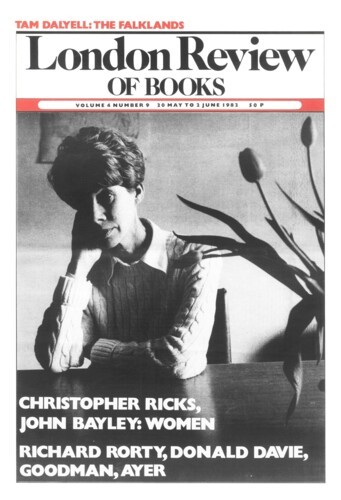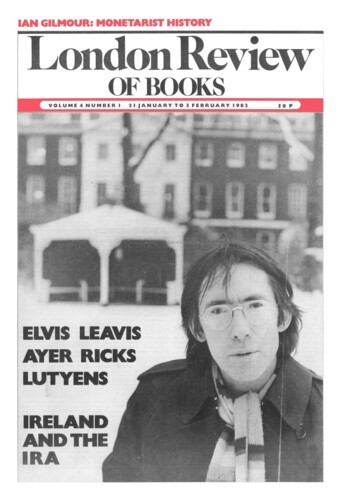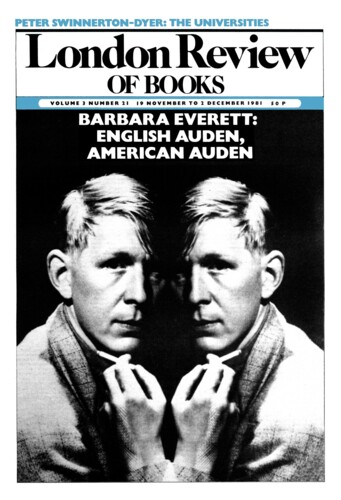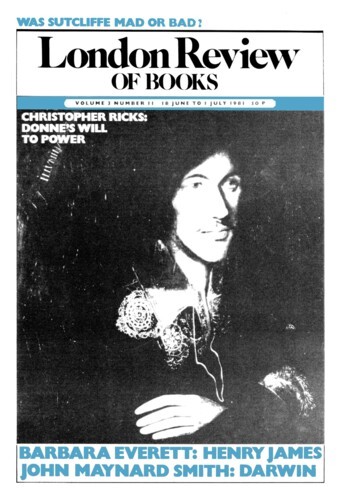Christopher Ricks
Christopher Ricks is the author of Keats and Embarrassment, among other books. He is a professor of English at Cambridge University.
Women
Christopher Ricks, 20 May 1982
‘Women are bitches.’ It was odd and ugly of J. R. Ackerley to put it like that, since both the sentence before this terse rancour and the one after it dote upon a bitch, his dog Queenie. Much-loved Joe Ackerley was not much-loving, but he did love his dog, loved her even more than he loathed his sister Nancy. Nancy loathed them both back. She also loathed their old aunt Bunny, whom Ackerley only intermittently hated. When Ackerley took a break, he contrived a busman’s Roman holiday, since he went to stay with Siegfried Sassoon, who was fully occupied loathing his wife, as she him. ‘He was obviously very wrought up over her emotional persecution of him, and described at much length her jealous rows, resentments, emotional blackmail, etc. He was describing Nancy.’ Nancy was chagrined at not having been invited, so Ackerley gave it her straight:
Playing with terror
Christopher Ricks, 21 January 1982
Ian McEwan’s tale is as economical as a shudder. It never itself shudders, which is one reason why it makes you do so. By staying cool in the face of the murderous madness which it contemplates, it precipitates an icy sweat. What it does even with equanimity is not to display it. A characteristic McEwan sentence is one of which it might be said (here in Venice revisited) that the law allows it and the court awards it. ‘She loved him, though not at this particular moment.’ This means what it says, exactly. It is not a warrant for sarcasm’s burliness, for inferring that she didn’t really love him at other moments, or that she really disliked him at this particular moment. Grim, laconic and humorous, it is a bracing sentence, a short, sharp shock.
Citizens
Christopher Ricks, 19 November 1981
‘Authors are not the solitaries of the Romantic myth, but citizens.’ The spirit of Marilyn Butler’s excellent book on the Romantics is itself that of citizenship: of belonging to a civilised community, cultural and intellectual, which one helps to sustain and is sustained by, and which makes possible the truest duties, rights and privileges. Rewards, too, and the rewards of this radiating and radiant book are great. For if from one point of view Marilyn Butler is the citizen of a smallish community within a community – those within universities who speak of English literature – from another she is importantly and not self-importantly a citizen of the world. The term naturally has its good-natured comedy, and she describes it – when conferred by Goldsmith on his visiting Chinaman, a penetrating watcher of 18th-century English civilisation – as ‘a phrase both levelling and universal’. (One, incidentally, which itself helps to sustain a community of the like-minded, since Goldsmith shares the right to it with his fellow citizens Caxton and Bacon.) Dr Butler is a citizen of the world not only in that she does not – cannot, in pursuit of her essential questions – limit herself to English Romanticism; and not only in that she writes with a witty clarity, humane and free, such as makes her book uncondescendingly open to a much larger world than the academic one; but also in that her preoccupation is the pressure of the great world upon Romantic literature – the pressure, in particular, of national and international affairs.
Donne’s Will to Power
Christopher Ricks, 18 June 1981
Donne’s powers are, for John Carey, a matter of power, the poems being ‘the most enduring exhibition of the will to power the English Renaissance produced’. The praises of Donne in this critical work of amazing flair and obduracy are single-minded: Donne is here valued, supremely, for the power and tenacity of his ego, for his imaginative energy, for his desire to dominate or his rage for supremacy, and for the obsession with which he registered the contrarieties and contradictions of life ‘in all their urgent discord’. For Carey, these powers, these sheer strengths, sweep everything before them, razing moral questions to moralism, spiritual values to pietism, and critical reservations to prissiness. Carey’s book is itself alive with the kind of energy which it attributes to Donne, and since he can think of no higher compliments than those he pays Donne, he will presumably be very happy to have them returned to him.
Pieces about Christopher Ricks in the LRB
Saturday Reviler: Fitzjames Stephen's Reviews
Stefan Collini, 12 September 2024
What really distinguished the Saturday Review was its tone – self-consciously unillusioned, unsentimental, exacting, a tone that announced the presence of high-quality butchers specialising in the...
Ti tum ti tum ti tum: Chic Sport Shirker
Colin Burrow, 7 October 2021
If one suspects, at times, that one’s eye is being led on a dance, it is at least always a merry one, and Christopher Ricks is a fine enough critic to worry whether he might have crossed the invisible...
I gotta use words: Eliot speaks in tongues
Mark Ford, 11 August 2016
T.S. Eliot’s mind was a vast, labyrinthine echo chamber, and perhaps more than any other canonical poet of the English language he was conscious of the previous uses by other writers of the words he...
Misgivings: Christopher Ricks
Adam Phillips, 22 July 2010
In his first book, Milton’s Grand Style, Christopher Ricks showed us that Milton wanted his readers to be attentive to the fact that when our ‘first parents’ fell, their...
Forget the Dylai Lama: Bob Dylan
Thomas Jones, 6 November 2003
A scene from a concert: on stage, a young Jewish-American folk singer/ songwriter, accompanied only by his own guitar and the harmonica around his neck, with a forceful, nasal voice and...
Poisonous Frogs: Allusion v. Influence
Laura Quinney, 8 May 2003
This book comes in two parts. The first, ‘The Poet as Heir’, investigates characteristic uses of allusion by major British poets of the 18th and 19th centuries: Dryden, Pope,...
Elegant Extracts: anthologies
Leah Price, 3 February 2000
Anthologies attract good haters. In the 1790s, the reformer Hannah More blamed their editors for the decay of morals: to let people assume that you had read the entire work from which an...
Writhing and Crawling and Leaping and Darting and Flattening and Stretching
Helen Vendler, 31 October 1996
When Emerson wrote to Whitman that there must have been ‘a long foreground’ preceding the composition of Leaves of Grass, he expressed the curiosity every reader feels when coming upon...
The Verity of Verity
Marilyn Butler, 1 August 1996
Christopher Ricks’s new book makes available many of his distinguished lectures given in the Eighties and Nineties. The essays retain a sense of occasion, and of a star performance on...
Leases of Lifelessness
Denis Donoghue, 7 October 1993
Near to death in Malone Dies, Malone says: ‘I wonder what my last words will be, written, the others do not endure, but vanish, into thin air.’ Beckett’s Dying Words is not a...
Good enough for Jesus
Charlotte Brewer, 25 January 1990
The second edition of The State of the Language, published ten years on from the first, contains 53 essays and nine poems, each by a different author. The dust-jackets of both editions are almost...
Negative Capability
Dan Jacobson, 24 November 1988
T.S. Eliot and Prejudice. Keats and Embarrassment. The parallel between the title of Christopher Ricks’s new book and that of his earlier study of Keats is not accidental. In each case he...
Spruce
John Bayley, 2 June 1988
On 9 May 1933, A.E. Housman, Professor of Latin at Trinity College, Cambridge, and a scholar worshipped and hated for his meticulous standards and his appalling sarcasms on the unscholarly,...
Tennyson’s Text
Danny Karlin, 12 November 1987
Writing in 1842 to his friend Alfred Domett, who had emigrated to New Zealand, Robert Browning enclosed ‘Tennyson’s new vol. and, alas, the old with it – that is what he calls...
Beddoes’ Best Thing
C.H. Sisson, 20 September 1984
‘This is,’ as Professor Ricks says, in his rather baroque manner, ‘a gathering of essays, not a march of chapters’; each essay ‘attends to an aspect, feature, or...
English Changing
Frank Kermode, 7 February 1980
That language changes, and that we cannot prevent it from doing so, is a fact known to all, though some of us can no more contemplate it with resignation than we can death and taxes. It is two...
Read anywhere with the London Review of Books app, available now from the App Store for Apple devices, Google Play for Android devices and Amazon for your Kindle Fire.
Sign up to our newsletter
For highlights from the latest issue, our archive and the blog, as well as news, events and exclusive promotions.




